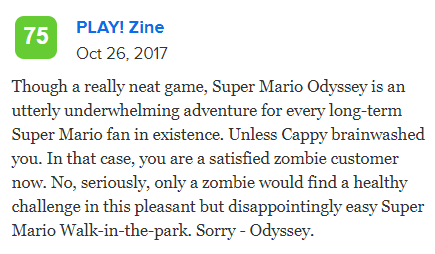Jesus this is the craziest story, and another example of why judgement-based criticism of games is misguided. https://twitter.com/charlesrandall/status/1264047502875078656">https://twitter.com/charlesra...
It’s easy to assume that any given game was made in a vacuum and the final product is the perfectly realized result of the developers’ creative ambition.
And following that logic any flaw in the game is due to the lack of ability or effort.
It’s the reason why “lazy devs” is the rallying cry of the Steam review.
It’s the reason why “lazy devs” is the rallying cry of the Steam review.
But games are so complicated to make. Budgets and deadlines are the obvious pressures, and sometimes the CEO’s kid can completely destroy the plans for a project.
Let& #39;s talk criticism for a moment. Where does it fit within the wider "World of Video Games" industry?
The official Game Reviewer is someone who& #39;s job it is to play a game and then to try and help someone decide if its worth their time and money.
Real consumer reports level stuff.
Real consumer reports level stuff.
But we& #39;re already hitting problems, because a game is not a toaster or a car or anything else with a practical application. A game is a piece of entertainment, artist endeavor, a new medium of human communication.
(this is that the discourse around "are games art" a couple decades ago was about. The dawning realization that games aren& #39;t simple consumer products or kid& #39;s toys)
A review of a toaster is straightforward: does it toast bread? If yes, then the critic can move into the finer points of the design and functions or whatever and assign it an appropriate score.
But how do you do that for a game? What is the function of a video game?
If it& #39;s simply to be a piece of entertainment then most games should get an A score. Unless a game is so buggy as to not run then its fulfilling its role.
If it& #39;s simply to be a piece of entertainment then most games should get an A score. Unless a game is so buggy as to not run then its fulfilling its role.
Obviously a game is much more than that. And so a reviewer& #39;s task becomes much more subjective.
They describe a game, weigh all the various details and designs, then assigns a score based on how successful they thought it was.
They describe a game, weigh all the various details and designs, then assigns a score based on how successful they thought it was.
But that& #39;s a completely subjective thing. What is successful for reviewer X might not be for reviewer Y.
Is this good consumer reporting? Does a subjective approach help a person make an informed purchase? Probably in aggregate.
Is it a good way to have conversations about games though? I don& #39;t think so.
Is it a good way to have conversations about games though? I don& #39;t think so.
Subjective consumer reports is a weird thing though, right? The question shifts from if the game is a worthwhile purchase to a judgment on its fundamental nature.
This is a hard thing to clearly express, it might be stated as "Does this game succeed at being itself?" Read a modern review and this seems to be the question, ultimately, that& #39;s trying to be answered.
But this is an impossible question TO answer. A game can only be itself. It& #39;s existence in the world is testament to that. If it was something else, it wouldn& #39;t be the game it was, warts and all. By this criteria every game deserves an A score.
Consider the Assassin& #39;s Creed example that started this thread. Is the game bad because the team was forced to cram in a bunch of side quests a week before launch, or good because they rose to that task and delivered with only one or two bugs?
Should the game be derided or celebrated because the capricious whims of a child resulted in the product as it exists?
Is game criticism even equipped to answer this question?
What could we even expect IGN to say?
Is game criticism even equipped to answer this question?
What could we even expect IGN to say?

 Read on Twitter
Read on Twitter



